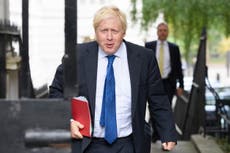Philip Hammond's conference speech fails to appeal to those vital young voters
So far the new policies offered up by the Tories run the risk of being judged Corbyn-lite by voters


A year ago, the chatter at the Conservatives’ conference was that they were lucky to have an opponent like Jeremy Corbyn, who they judged an unelectable throwback to a bygone era.
How times change. In Manchester this week, the Tories cannot disguise their fear that Corbyn is a winner. Everything has changed. The energy and excitement at Labour’s conference last week and a party united behind its leader, contrasts sharply with a gloomy, divided Tory Party that fears the political tide has turned in Labour’s favour, and knows its lame leader cannot limp on in her job beyond 2019.
At a fringe meeting, Theresa May made a revealing admission: “We thought there was a political consensus. Jeremy Corbyn has changed that. It’s our job to go out and make those arguments all over again.”
The Tories are not only split over Brexit, but also over how to respond to the Corbyn surge. Philip Hammond, the Chancellor, is in a traditionalist camp that believes the Tories should stick to their market economy guns, defend the capitalist system and warn that a Corbyn government would wreck the economy.
He told the Manchester conference on Monday that Labour had “been taken hostage by a clique of hard left extremist infiltrators” who would “demolish our successful market economy and replace it with a back-to-the-future socialist fantasy with hundreds of billions of extra debt for the next generation to pay off”. He acknowledged the dangers of banging on about the 1970s when that meant nothing to younger voters, but insisted the lessons of history must be learned. Yet his “Conservative definition of progress” – for each generation to be better off than the last – will ring hollow for 20 and 30 somethings who see no prospect of this. Where was his appeal to the Uber generation who see the value of enterprise and competition?
Tory consolidators are convinced the public will come to see the error of their (and Corbyn’s) ways when Labour is tested on the economy in an election in which it has a real chance of winning.
But other Tories fear this approach is dangerously complacent. They believe their party’s lack of support among the under-45s poses an existential threat to it. To turn the tide, they want bold policies to show the Tories can offer more than the status quo when voters cry out for change. Ideas doing the rounds in Manchester include scrapping stamp duty for first time-buyers; a dramatic boost for housebuilding, including in the Green Belt, with more affordable and social housing and tax rises for the rich to raise money for public services. Sir Oliver Letwin, the former cabinet minister who was David Cameron’s policy chief, made the case on Monday for higher taxes to fund health and social care. But Hammond slapped him down, reiterating the Tories’ traditional support for tax cuts and warning that increases could “choke off” growth. He should think again and raise taxes in his Budget next month.
The divide over strategy means the Tories pose as both defenders and reformers of the capitalist system, which leads to a fuzzy message – another contrast with Corbyn, who offers clarity as well as conviction.
So far the new policies offered up by the Tories run the risk of being judged Corbyn-lite by voters. Students (and their parents) are hardly going to cheer a freeze in university tuition fees (at £9,250 a year) when Labour would abolish them. The Tories also undermined their “magic money tree” attack on Labour’s spending plans by splashing £11bn on student funding and the Help-to-Buy scheme (the latter only underlining the Tories’ blind spot on social housing despite Grenfell Tower). George Freeman, who chairs the Tory policy board, argued that “culturally, millennials and the young are not socialists at all” and “want this system to work for them”. He was right to warn: “If we go down the road of ‘money tree’, turn-on-the-taps, be-all-things-to-all-people Corbyn solutions then they will vote for the real thing.”
It is very bad news for May that the two people eclipsing her at this conference are Corbyn and Boris Johnson. Some senior Tories are convinced the Foreign Secretary is goading May into sacking him so he can become a backbench “Brexit martyr”. Tory members may like his “red lines” on Brexit but his disloyalty and posturing has alienated many Tory MPs. Boris seems to have concluded that to win the crown, he needs May to depart before 2019, so he is rattling her cage. But he should remember that MPs choose the shortlist of two from which Tory members elect the leader.
May should sack Johnson but her own ministers suspect she is too weak to do it. Dismissing him would also help to break the cabinet impasse over the long-term UK-EU relationship. May could reject Boris’s vision of a clean break and get fully behind Hammond’s plan to hug the EU close to limit the economic damage. A sensible rather than reckless Brexit might even enhance the Tories’ appeal to younger voters.
Despite Hammond’s assertion that the Tories represent the future and Labour the past, voters seem to be reaching the opposite conclusion.


Join our commenting forum
Join thought-provoking conversations, follow other Independent readers and see their replies